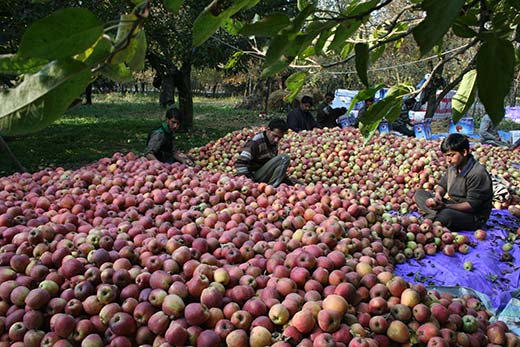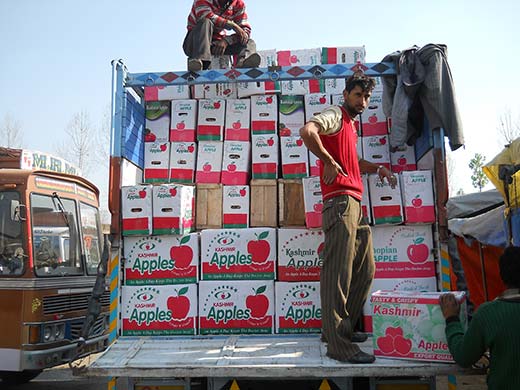Despite increase in production apple growers in south Kashmir are finding it hard to carry on the occupation as quality of the produce has decreased. Saima Bhat reports the factors that analysts believe, if not tackled timely, will change Kashmir’s apple identity forever

The September 7, 2014 floods washed away many things with it including hopes of Kashmir’s major horticulture activity: apple cultivation, in South Kashmir. Despite a jump of around 30 lakh boxes, taking overall production to 3 crore boxes in 2014, Kashmir’s apple town Shopian is one big painful story.
“The increase in production was shadowed by massive decrease in quality,” says Abdul Shakoor Wani, a member of Shopian Fruit Growers Association, who owns 60 kanals of apple orchids in the town.
In 2013, out of total 2.70 crore boxes about 50 per cent were of A-grade quality, thus sold within days of opening the trade in October. But 2014, the year that farmers consider as cursed, started on a bad note with diseases like scab affecting the produce. And then came the flash-floods and decline in quality of apples. “This year (2014) we have just 20 per cent A-grade quality apples while rest was all B and C-grade,” says Shakoor. “In markets outside Kashmir only A-grade quality apples fetch a farmer good prices rest is all a burden for a grower.”
In 2014 an A-grade box of apples was sold between Rs 600 and 800, while the same fetched a grower between Rs 800 and 1000 in 2013. Interestingly, in March/April 2014, an A-grade apple box, kept in cold storage, was sold at Rs 3600.
It was because of the floods that Shopian Fruit Mandi, one of the biggest markets for apple trade in Kashmir with a capacity to handle around 1.5 lakh boxes a day, remained deserted for most of the time. “In normal times we used to have buyers from places like West Bengal, Maharashtra, Bangladesh, and Madhya Pardesh etc. but floods changed everything. It sort of scared buyers. Besides there was not much to buy in terms of quality,” says Shakoor.
According to local trade analysts the downfall in A-grade quality apples by more than 60 per cent has hit the sector to a tune of Rs 1000 crore, if not more.
But what are the reasons behind such a drastic change in the quality of apples? “Since last few years markets in Kashmir are flooded with spurious chemicals, fertilizers and sprays. It took us a while to realize that we are spraying our trees with poison rather than pesticide,” says Shakoor. “It (spurious chemicals and sprays) has destroyed the trees and affected the quality as well.”
Horticultural production contributes about 50 per cent to the overall agricultural production of the state, involving 30 lakh people.
Out of which, the horticulture industry in Kashmir is worth Rs 1,200 crore yearly, a major share of around 86 percent comes from the apple crop.
State’s apple industry contributes nearly 70 percent of the total apple production in India. But in recent years the visible change in the quality of apples has affected the market share of Kashmiri apples badly. The situation provoked Mehbooba Mufti, MP representing South Kashmir, to speak in the recent parliament session about catastrophic affects on growers if some measures are not taken regarding relief and rehabilitation. “The horticulture sector has for the past four years failed to give any returns to the growers, and if left unattended it could lead to a grave humanitarian crisis of grower suicides,” said Mehbooba.
But the farmers are still awaiting any package from GOI. “The GOI has not released the remaining 50 per cent of relief amount for flood victims so keeping hopes with them is futile,” said Mehbooba.
For another grower, Waseem Hassan Wani, who owns 28 kannals of apple orchard in Shopian, the production of more B-grade apples would not have ‘crashed’ the market if Kashmir had the surplus of cold storage plants and the juice factories.

Pic: Bilal Bahadur
“If we had the juice factories they would have given us better rates for B and C grade apples than what we got in Delhi or local mandis,” feels Waseem.
In 2014, a box of B-grade quality apples was sold between Rs 250 and 550, while a box of C-grade apples fetched a grower between Rs 150 and 250 in the local market. “This amount is not enough to even cover costs required for pre-harvest activities,” says Waseem.
The decrease in production of A-grade quality apples has left growers in a dilemma. Waseem sold his produce of 800 boxes (All B and C-grade quality) for Rs 2.50 lakh. “I am worried how I will be able to prepare my trees for the next season,” says Waseem.
Out of Rs 2.50 lakh that Waseem earned from his produce, he had spent Rs 1 lakh on pesticides and fertilizers, deposited another Rs 60,000 in bank as installments, and had to shell out Rs 30,000 towards insurance. “Now tell me how I will manage next season’s crop and feed my family for entire year in remaining Rs 60,000?” asks Waseem.
But if the produce would have been of A-grade quality then Wani may have earned Rs 8 lakh, out of which he could have saved Rs 5.50 lakh.
Both Shakoor and Waseem feel that it is the grower who has to suffer on all accounts; be it diseases, spurious sprays and pesticides, bank interest, insurance or decline in quality.
Before banks started giving loans to the farmers, they used to get money from the middle order market functionaries and commission agents, who have brought the apple industry to its knees. “The best way to avoid such exploitation is to sell your produce through local Mandis only. But that does not happen all the time and growers end up in a web of debt,” says Shakoor.
Intervention
In the past, toll tax, commission to the agents, truck fares, labour charges, boarding charges and many more hidden charges never allowed a local farmer to breathe freely. In 2007, the then PDP-Congress coalition government, abolished toll tax, established local fruit markets (Mandis) and introduced bank sponsored easy loan schemes.
In 2007 J&K Bank sponsored Apple Advance Scheme (AAS)’ to do away with the unwanted intermediaries and reframe the finance as per the growing inflation. Under this scheme, growers having the orchards in their own name are eligible for a cash credit facility and for the growers having only leased orchards, Secured Overdraft (SOD) facility was granted. The facility is granted to meet the cost of fertilizer, fungicides, pesticides, etc and post production charges as well.
“It helped us a lot in stabilizing our lives. But the decrease in quality and dwindling profits pushed us to the wall once again. We could not even deposit installments on time,” says Waseem.
The problem with sending your produce outside the state is that a Commission Agent or trader in Azadpur or elsewhere in India exploits growers by charging money for things like usage of space, labour charges including unloading and loading of boxes, charges for using the space where the trade happens. There are many small hidden costs that pile up and eat into a grower’s profit. “Despite government abolishing all hidden charges we still have to pay 12 per cent towards commission agents or fruit merchants sitting in big Mandis,” says Waseem. “So in practicality, nothing has changed for us. We are still being exploited in one way or the other,” feels Waseem, who had to pay a commission of Rs 40492 as “other expenses” on a total bill of Rs 337435.
“Interestingly the same kind of agents in Kashmir Mandis charge between 3 and 6 per cent,” says Waseem.
Earlier getting loan from a local bank in Kashmir was easy for a grower, but mounting paper work and excessive interest rates have forced them to go back to traditional money lenders. “These money lenders in Delhi and elsewhere are exploitative. But then a grower has to survive and run his house,” says Waseem.
Habibullah Mir, a fruit grower from Srinagar says, “In this way banks are (indirectly) contributing to the survival of the old traditional system of informal funding by commission agents.”
J&K Bank’s ‘Apple Project’, which is believed to be the outcome of RBI’s repeated snubs to the bank for maintaining a low level of 11% as against the stipulated 18% funding to the priority sector of agriculture.
The malpractice by commission agents had three types of harm to the apple economy: encouraging economic feudal/slavery type system of lending by commission agents; misuse of bank capital for usurious lending by commission agents; and encouraging continuation of unmonitored system of captive orchard owners paying commission to commission agents in violation of Jammu and Kashmir Agricultural Produce Marketing [Regulation] Act of 1997 (APMC), revealed a report by National Bank for Agriculture and Rural Development (NABARD).
The report added: in violation of APMC it is the grower in valley who is forced to pay commission to the agents in Delhi for forwarding and trading of apple. It is the other way round in the rest of the country.
“More than that our trees are dying a silent death,” says Waseem.
The start of new cold atmosphere storage (CAS) unit was supposed to ease out the burden of farmers. But Wani says, “50,000 apple boxes stored in one such CAS got rotten. These CAS units are located away from orchids so B and C grade apples are more prone to get rotten. So I suggest if we could have such units at every place that may solve our problems and may be, the produce will not get waste.”
As per the NABARD survey report thousands of acres of Kashmir’s undulating apple orchards may soon be a waste land.















